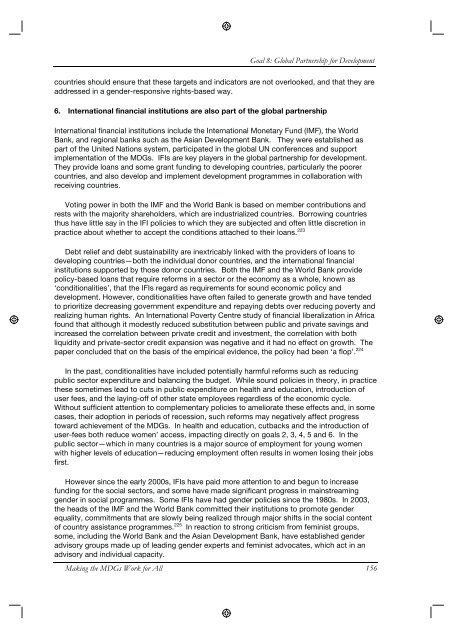Goal 8 - CEDAW Southeast Asia
Goal 8 - CEDAW Southeast Asia
Goal 8 - CEDAW Southeast Asia
Create successful ePaper yourself
Turn your PDF publications into a flip-book with our unique Google optimized e-Paper software.
<strong>Goal</strong> 8: Global Partnership for Development<br />
countries should ensure that these targets and indicators are not overlooked, and that they are<br />
addressed in a gender-responsive rights-based way.<br />
6. International financial institutions are also part of the global partnership<br />
International financial institutions include the International Monetary Fund (IMF), the World<br />
Bank, and regional banks such as the <strong>Asia</strong>n Development Bank. They were established as<br />
part of the United Nations system, participated in the global UN conferences and support<br />
implementation of the MDGs. IFIs are key players in the global partnership for development.<br />
They provide loans and some grant funding to developing countries, particularly the poorer<br />
countries, and also develop and implement development programmes in collaboration with<br />
receiving countries.<br />
Voting power in both the IMF and the World Bank is based on member contributions and<br />
rests with the majority shareholders, which are industrialized countries. Borrowing countries<br />
thus have little say in the IFI policies to which they are subjected and often little discretion in<br />
practice about whether to accept the conditions attached to their loans. 223<br />
Debt relief and debt sustainability are inextricably linked with the providers of loans to<br />
developing countries—both the individual donor countries, and the international financial<br />
institutions supported by those donor countries. Both the IMF and the World Bank provide<br />
policy-based loans that require reforms in a sector or the economy as a whole, known as<br />
‘conditionalities’, that the IFIs regard as requirements for sound economic policy and<br />
development. However, conditionalities have often failed to generate growth and have tended<br />
to prioritize decreasing government expenditure and repaying debts over reducing poverty and<br />
realizing human rights. An International Poverty Centre study of financial liberalization in Africa<br />
found that although it modestly reduced substitution between public and private savings and<br />
increased the correlation between private credit and investment, the correlation with both<br />
liquidity and private-sector credit expansion was negative and it had no effect on growth. The<br />
paper concluded that on the basis of the empirical evidence, the policy had been ‘a flop’. 224<br />
In the past, conditionalities have included potentially harmful reforms such as reducing<br />
public sector expenditure and balancing the budget. While sound policies in theory, in practice<br />
these sometimes lead to cuts in public expenditure on health and education, introduction of<br />
user fees, and the laying-off of other state employees regardless of the economic cycle.<br />
Without sufficient attention to complementary policies to ameliorate these effects and, in some<br />
cases, their adoption in periods of recession, such reforms may negatively affect progress<br />
toward achievement of the MDGs. In health and education, cutbacks and the introduction of<br />
user-fees both reduce women’ access, impacting directly on goals 2, 3, 4, 5 and 6. In the<br />
public sector—which in many countries is a major source of employment for young women<br />
with higher levels of education—reducing employment often results in women losing their jobs<br />
first.<br />
However since the early 2000s, IFIs have paid more attention to and begun to increase<br />
funding for the social sectors, and some have made significant progress in mainstreaming<br />
gender in social programmes. Some IFIs have had gender policies since the 1980s. In 2003,<br />
the heads of the IMF and the World Bank committed their institutions to promote gender<br />
equality, commitments that are slowly being realized through major shifts in the social content<br />
of country assistance programmes. 225 In reaction to strong criticism from feminist groups,<br />
some, including the World Bank and the <strong>Asia</strong>n Development Bank, have established gender<br />
advisory groups made up of leading gender experts and feminist advocates, which act in an<br />
advisory and individual capacity.<br />
Making the MDGs Work for All 156

















